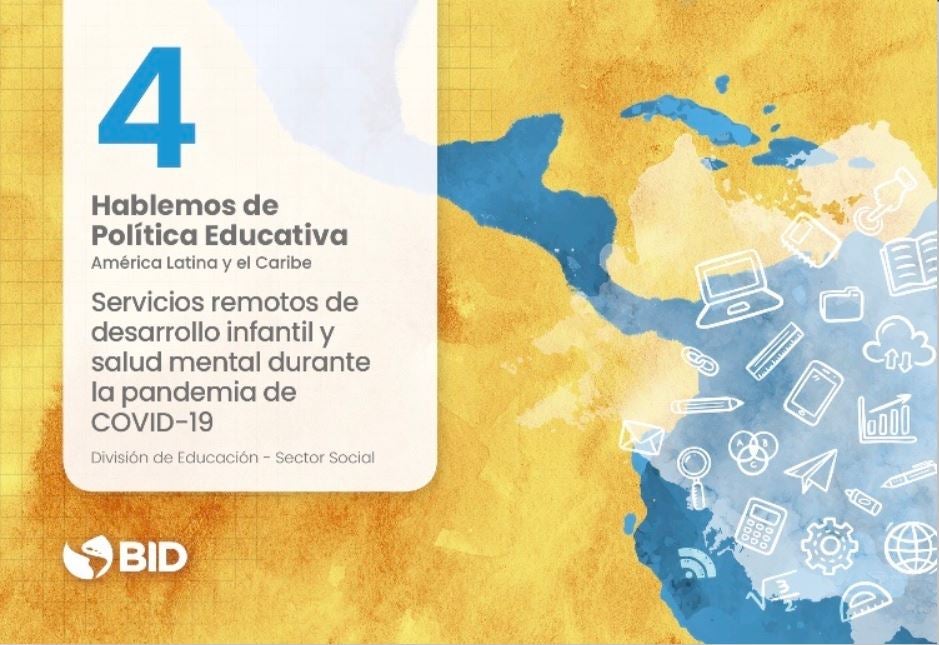Guiselle Alpizar, Loreto Biehl (BID), Juan Manuel Hernandez-Agramonte (IPA), Ursula Luna, Laura Ochoa Foschini, Juan Maragall (BID), Carolina Méndez (BID), Kelly Montaño, Olga Namen, Emma Näslund-Hadley (BID), Brunilda Peña de Osorio (MINED) y Jennelle Thompson (BID)
School closures in the wake of the COVID-19 pandemic have created an unprecedented disruption to education systems for 1.6 million learners in 190 countries. Overnight, education worldwide shifted from face-to-face instruction to entirely remote learning environments. Although the speed with which emergency remote education was launched in several education systems efforts is laudable, it harbors many challenges for children’s learning and wellbeing.
Through a survey of 62,837 caregivers of young children in four Latin American countries, we asked households about their experiences with emergency distance education and mental health during the pandemic. The caregivers responded to a self-administered online survey, mainly filling it out using smartphones, which are widely used across socioeconomic groups in the participating countries. This survey gives us a first window into how the crisis is affecting the health of children and youth, their caregivers, and educators.
Our findings suggest that mental health consequences on an unprecedented scale among children are looming in Latin America. The survey suggests that the COVID-19 crisis will increase already existing learning inequalities, as some children will have the opportunity to continue progressing during the crisis, while their peers from families from low socio-economic status lose ground. Households from a low socioeconomic status reported greater increases in food insecurity that they attribute to the crisis, raising flags about long-term effects on children’s brain development and growth.
Caregivers also report that their children present increased symptoms of distress during the pandemic, 61% of them displaying at least one symptom of mental distress. Around a third of children have trouble sleeping and are sad, and two fifth are nervous and worried. On average, caregivers report that girls experience more symptoms of mental distress, ranging from a 4.4% gap in worry to a 3.3% gap in insomnia. The caregivers’ concerns about children’s mental wellbeing are echoed by the children’s educators who report that they worry about their students’ mental wellbeing, with 9% stating that families contact them with concerns about high levels of child distress.
But it is not just the children that policy makers need to be concerned about. We find that caregivers’ mental distress is strongly correlated with the mental distress of children. Controlling for socioeconomic level, the distress of the caregiver increases the level of distress of children by 55%. Caregivers of children in the 0 to 7 age-group report substantial impacts of the COVID-19 pandemic on their own mental health. The levels of distress are particularly elevated among mothers who shoulder the bulk of the burden of supporting children’s remote education.
A vast majority of the 62,837 caregivers surveyed report experiencing at least one symptom of deteriorated mental health during the pandemic. Roughly half of the caregivers report feeling sad (48%), and around six out of ten are tired (66%), fearful (60%) and have insomnia (59%). Four out of ten report a lack of appetite (41%). We found that the higher the level of distress of caregivers, the lower their levels of investment in their children in terms of quality time (e.g. playing, reading and singing); and type and quantity of toys, including homemade toys (the correlation is significant at the 5% level).
All four countries – Colombia, Costa Rica, El Salvador, and Peru – have adapted a multiplicity of approaches to relieve the social and mental health impact of the COVID-19 crisis on young children’s wellbeing. This survey makes clear, however, that despite existing efforts, Latin America’s policy makers need to take forceful action on two fronts. First, make investments to reduce the stressors for households with young children, such as the provision of food to vulnerable households. Second, nations must invest directly in mental health support for ECD centers and schools in preparation eventual reopening.
This regional study is the result of a collaboration between the Ministries of Education in El Salvador (MINED), Perú (MINEDU) and Costa Rica (MEP) and the Institute of Family Wellbeing in Colombia (ICBF) joined forces with Innovations for Poverty Action (IPA) and the Inter-American Development Bank (IDB). If you want to know more read our note in the IDB series Let’s Talk Education Policy. We thank the IDB ECD Fund, FEMSA and Open Society Foundation for generous funding.
How should ministries of education respond to the mental health needs of students? What are best practices of ministries of health and education joining forces to promote the mental health of young children and their families? Share your comments with us in the section below, or comment on Twitter @BIDEducacion #EnfoqueEducacion #Hubdedesarrolloinfantil @Poverty_Action.


Leave a Reply